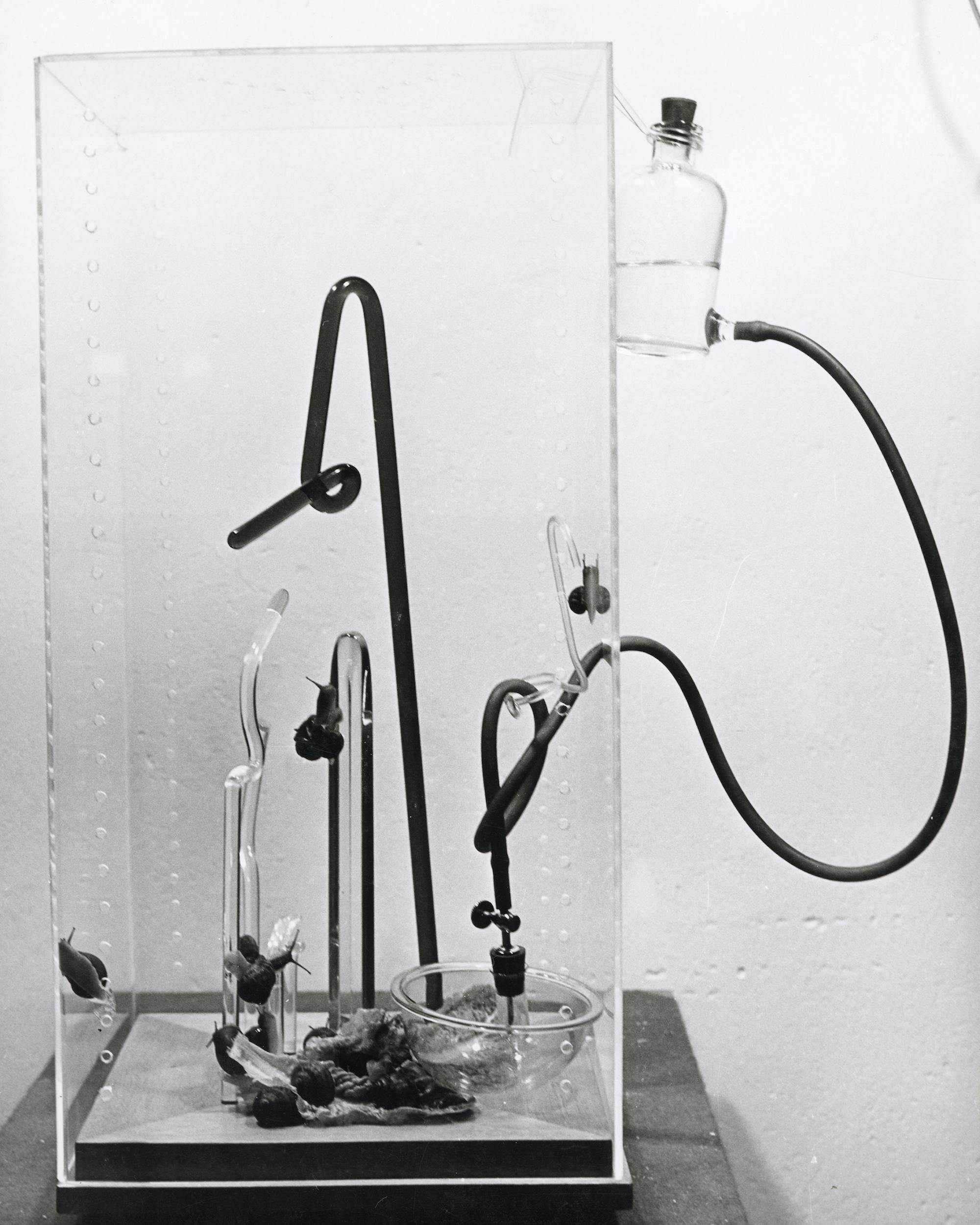Networks in Cybernetic, Conceptual, and Ecological Art: Luis Fernando Benedit in Context

Saturday, January 18, 2025
2:00 PM EST
Register for the event
Please join us for a panel exploring the environment of radical experimentation that fostered Argentine artist Luis Fernando Benedit’s groundbreaking work, organized in conjunction with the exhibition Luis Fernando Benedit: Invisible Labyrinths. This event will feature presentations by scholars Jens Andermann, Julia Detchon, and Daniel R. Quiles, as well as a conversation moderated by curator Laura Hakel. It will be followed by a reception and an opportunity to view the exhibition at ISLAA.
Through his uncompromising commitment to experimental practices and his pioneering investigations into ecology and power, Benedit became an influential figure in the global development of Conceptualism, cybernetics, and Systems art. His participation in the Buenos Aires–based Centro de Arte y Comunicación (CAYC) resulted in his iconic “habitats” (plexiglass environments for plants and animals), and led to the presentations of his large-scale installations at the 35th Venice Biennale and the Museum of Modern Art in the early 1970s. Situating Benedit’s practice in relation to his local and global contexts, the panelists will place his creative output in dialogue with the trailblazing work of other artists engaging with ecology, cybernetics, Systems art, and experimental practices in Latin America and beyond.
The event will take place at ISLAA, located at 142 Franklin Street in Tribeca. Seating is limited, and attendees are encouraged to register in advance. The program will be held in English, and a recording will be made available online after its conclusion.
ABOUT THE SPEAKERS
Jens Andermann is David B. Kriser Professor in the Humanities at New York University and an editor of the Journal of Latin American Cultural Studies and the book series SubAtlantic: Latin American, Caribbean, and Luso-African Ecologies. He writes about literature, film, art, and their interfaces with extractivism, memory, and survivance in the circum-South Atlantic. Andermann has taught at multiple universities in Europe and the Americas, including Birkbeck, University of London, Universidad de Buenos Aires, Universidade Federal do Rio de Janeiro, Universität Zürich, Duke University, Princeton University, and Columbia University. His recent publications include Jardín (Bifurcaciones, 2023); Entranced Earth: Art, Extractivism, and the End of Landscape (Northwestern, 2023; Spanish: Metales Pesados, 2018); New Argentine Cinema (I. B. Tauris, 2011; Spanish: Paidós, 2015); and The Optic of the State: Visuality and Power in Argentina and Brazil (Pittsburgh 2007; Portuguese: EdUERJ, 2014).
Julia Detchon is a curatorial associate in Latin American art at the Museum of Modern Art. She has a PhD from the University of Texas, where her dissertation, "Working Around: Lea Lublin, Marie Orensanz, Mirtha Dermisache, Margarita Paksa and the Active Spectator, 1968–1983," focused on the conceptual practices of four artists affiliated with the Centro de Arte y Comunicación. Her research has been supported by a Mellon International Dissertation Fellowship from the Social Science Research Council, a Fulbright Fellowship with the Instituto Interdisciplinario de Estudios de Género at the Universidad de Buenos Aires (IIEGE–UBA), and an Andrew W. Mellon Fellowship in Latin American Art at the Blanton Museum of Art. Before attending graduate school, she held curatorial positions at the National Gallery of Art, the Art Institute of Chicago, and the Mary and Leigh Block Museum.
Laura Hakel is a curator, writer, and researcher. She is currently curator of the collection and artistic projects at the Fundación Ama Amoedo, Uruguay. Previously, she was ISLAA curatorial fellow at the New Museum, New York, and curator at the Museo de Arte Moderno de Buenos Aires, where she curated exhibitions and special projects such as Gabriel Chaile: Patricia (2017), Mercedes Azpilicueta: Body Birds (2018), Flavia Da Rin. Who’s That Girl? (2019), and Andrés Aizicovich. Contacto (2019). She has contributed to publications including Stranieri Ovunque – Foreigners Everywhere (2024), Latin American Artists (2023), and Prime: Art's Next Generation (2022). She has a BA in art history from the University of Buenos Aires and an MA in curatorial studies from the Center for Curatorial Studies, Bard College.
Daniel R. Quiles is an art critic and an associate professor of art history, theory, and criticism at the School of the Art Institute of Chicago, where he teaches courses on the theory and history of postwar art of the Americas. His academic research has focused on Argentinean conceptualism as well as broader questions related to new media and politics in Latin American art. He received his PhD from the City of New York Graduate Center in 2010. Quiles was a 2003–04 critical studies fellow in the Whitney Independent Study Program, received a 2013 Warhol Foundation Arts Writers Grant, and was the 2013–14 Artlas Post-Doctoral Fellow at École Normale Supérieure in Paris. His research has appeared in academic journals such as Art Journal, ARTMargins, and Caiana. In 2017, he published a book-length conversation with Jaime Davidovich as part of Fundación Cisneros's interview series with Latin American artists.